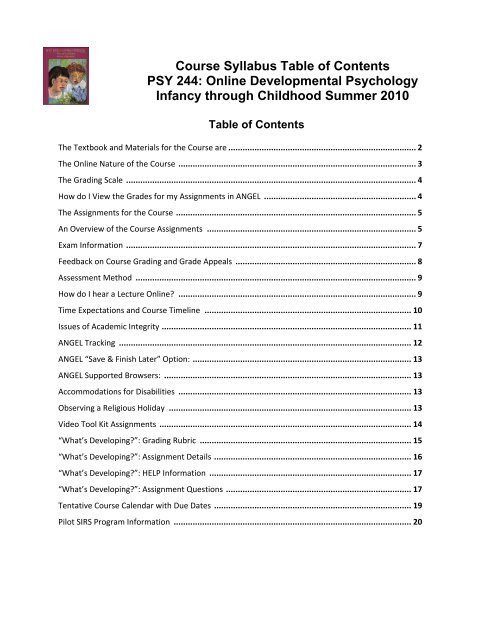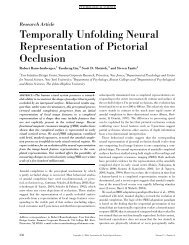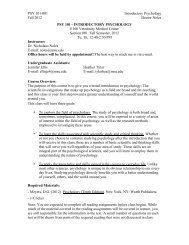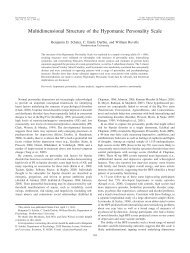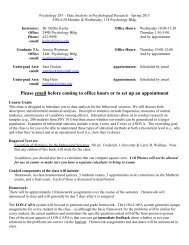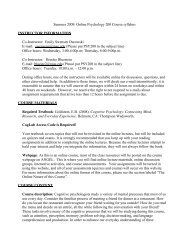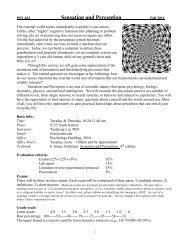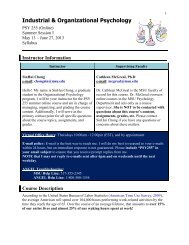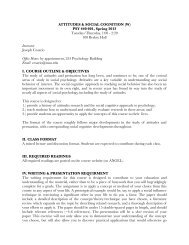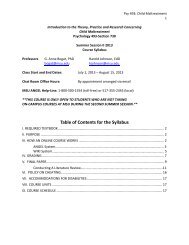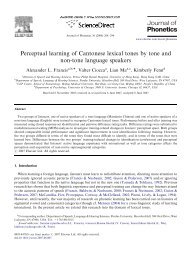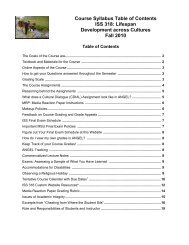Course Syllabus Table of Contents PSY 244 - Department of ...
Course Syllabus Table of Contents PSY 244 - Department of ...
Course Syllabus Table of Contents PSY 244 - Department of ...
You also want an ePaper? Increase the reach of your titles
YUMPU automatically turns print PDFs into web optimized ePapers that Google loves.
<strong>Course</strong> <strong>Syllabus</strong> <strong>Table</strong> <strong>of</strong> <strong>Contents</strong><br />
<strong>PSY</strong> <strong>244</strong>: Online Developmental Psychology<br />
Infancy through Childhood Summer 2010<br />
<strong>Table</strong> <strong>of</strong> <strong>Contents</strong><br />
The Textbook and Materials for the <strong>Course</strong> are ............................................................................... 2<br />
The Online Nature <strong>of</strong> the <strong>Course</strong> .................................................................................................... 3<br />
The Grading Scale .......................................................................................................................... 4<br />
How do I View the Grades for my Assignments in ANGEL ................................................................ 4<br />
The Assignments for the <strong>Course</strong> ..................................................................................................... 5<br />
An Overview <strong>of</strong> the <strong>Course</strong> Assignments ........................................................................................ 5<br />
Exam Information .......................................................................................................................... 7<br />
Feedback on <strong>Course</strong> Grading and Grade Appeals ............................................................................ 8<br />
Assessment Method ...................................................................................................................... 9<br />
How do I hear a Lecture Online .................................................................................................... 9<br />
Time Expectations and <strong>Course</strong> Timeline ....................................................................................... 10<br />
Issues <strong>of</strong> Academic Integrity ......................................................................................................... 11<br />
ANGEL Tracking ........................................................................................................................... 12<br />
ANGEL “Save & Finish Later” Option: ............................................................................................ 13<br />
ANGEL Supported Browsers: ........................................................................................................ 13<br />
Accommodations for Disabilities .................................................................................................. 13<br />
Observing a Religious Holiday ...................................................................................................... 13<br />
Video Tool Kit Assignments .......................................................................................................... 14<br />
“What’s Developing”: Grading Rubric ......................................................................................... 15<br />
“What’s Developing”: Assignment Details ................................................................................... 16<br />
“What’s Developing”: HELP Information ..................................................................................... 17<br />
“What’s Developing”: Assignment Questions .............................................................................. 17<br />
Tentative <strong>Course</strong> Calendar with Due Dates ................................................................................... 19<br />
Pilot SIRS Program Information .................................................................................................... 20
Instructors:<br />
<strong>Course</strong> Developed by:<br />
Cathleen E. McGreal, Ph.D. mcgreal@msu.edu<br />
Your <strong>Course</strong> Instructor:<br />
Brent Lyons<br />
lyonsbr3@msu.edu<br />
Office Hours: Listed on our ANGEL site<br />
Our goal is to respond within 24 hours. (Mon – Fri)<br />
Often we are able to respond the same day.<br />
Questions about technical aspects <strong>of</strong> the course with<br />
ANGEL or the lectures in Breeze:<br />
CALL MSU HELP LINE: 1-800-500-1554 or<br />
(517) 355-2345<br />
Online Developmental Psychology: Infancy through Childhood*<br />
Prerequisite: <strong>PSY</strong> 101<br />
“What was your favorite toy when you were in kindergarten”<br />
Think for a moment:<br />
How might that toy have enhanced your motor skills, imagination, language or social skills<br />
Do you study for college classes using the same strategies that worked in fifth grade<br />
Probably not!<br />
Developmental psychologists use the scientific method to address continuities and discontinuities <strong>of</strong><br />
development through empirical research.<br />
Psych <strong>244</strong> covers prenatal development through childhood, focusing on changes in the brain and body,<br />
cognition, emotions, personality, contexts <strong>of</strong> development and interpersonal relationships.<br />
The Goals <strong>of</strong> the <strong>Course</strong> are:<br />
To analyze key issues <strong>of</strong> child development, including major theories and concepts <strong>of</strong> development as<br />
well as to identify major researchers and theorists.<br />
To understand the methods used in developmental psychology (how we know what we know!) and to<br />
think critically when analyzing developmental research.<br />
To gain awareness and demonstrate how individuals stay the same over time (continuities) and how<br />
individuals change (discontinuities).<br />
To learn how to interact sensitively with children and to apply the ideas learned to your own life<br />
experiences.<br />
The Textbook and Materials for the <strong>Course</strong> are:<br />
Berger, Kathleen S. (2009). The developing person through childhood. (Fifth<br />
edition). New York: Worth Publishers.<br />
Video Tool Kit for Human Development, Worth Publishers. This is a website with FLASH activities and<br />
videos. An access code to the site is typically bundled with new books to reduce cost to access<br />
the site. If you purchase a used book then access to the Video Tool Kit is purchased at the<br />
website for $18.95. The Class Name at the site is Psych <strong>244</strong>_2010 and the Class ID is Mc77.<br />
URL: http://bcs.worthpublishers.com/devtk/player/pages/login.aspxuid=0&rau=0<br />
Books will be available through the bookstore on the campus at Michigan State University,<br />
http://www.spartanbook.com/ (go to secure online ordering) , the Student Book Store<br />
http://www.sbsmsu.com/ and other area bookstores as well as at online sources.<br />
Page 2
Frequently asked textbook question: What if I find a used copy Berger's The Person through<br />
Childhood AND ADOLESCENCE (Eighth edition) Can I buy it<br />
If you get a good deal then you may buy that book. Notice that it is the 8 th edition instead <strong>of</strong> the 5 th<br />
edition. It is the same as the childhood edition; it just has the extra chapters on adolescence. It is the<br />
8 th edition because she didn’t start pulling out the childhood chapters for a separate book for the first<br />
three editions <strong>of</strong> her child/adolescent book. We order the childhood text because it is a paperback book<br />
and it is less expensive than this hard-cover edition. Since MSU <strong>of</strong>fers Psych 344 we don’t cover any <strong>of</strong><br />
the adolescence chapters that would make the additional expense worthwhile. But if you find the book<br />
used and it is economical then that would be an appropriate choice. Then you would order the Video<br />
Tool Kit site separately unless it came with your used book. Two <strong>of</strong> my children attend MSU and my<br />
motto regarding textbooks is, “Go the least expensive route that still gives you the tools you need for the<br />
class.”<br />
The Online Nature <strong>of</strong> the <strong>Course</strong><br />
This course will be held entirely online through the ANGEL course management system. There will be<br />
no face-to-face classes or tests. You won’t need to come to campus. Each assignment will tell you the<br />
ANGEL method that will be used for submission. Since this course is completely online, you WILL need<br />
to make sure that you will have consistent access to the Internet throughout the course. This course<br />
requires a high speed internet connection. You also need to be on a computer that allows downloads <strong>of</strong><br />
free browser plug ins so that you can watch movies and listen to lectures. A community library would<br />
have to have FLASH installed, for example, in order for you to see and hear the lecture.<br />
If there is a problem during a test report it as soon as possible to the MSU HELP LINE at 1-800-500-<br />
1554 or (517) 355-2345. They will log the problem and in turn, report it to us. These technical problems<br />
should be reported immediately (maximum within 6 hours). You may also report the problem to us<br />
(although we are not available 24/7 like the Help Line ) If there is a system problem then hearing<br />
about what happens from more than one student helps them discover what has gone wrong. If it is just<br />
a problem with your computer then they can help trouble shoot that issue, too. If we find out a day or two<br />
later that there was a problem with a connection then it is difficult to resolve the issue in regard to a<br />
particular exam. Keep the ANGEL help numbers by your computer in case there is a problem.<br />
Getting Answers to your Questions throughout the semester<br />
First, check out the syllabus and then the FAQ discussion board. Another student may have had the<br />
same question earlier in the course and you won’t have to wait at all for your answer! If your answer is<br />
not there then send an email through ANGEL. (See below)<br />
You may want to post a question at the Class Lounge because another student may see it and happen<br />
to know the answer (handy at 2:00 a.m.!). Instructors only go into the Class Lounge now and then; if you<br />
expect instructors to reply then direct an email to us, don’t post a question to other students. If a post is<br />
<strong>of</strong> common interest we will move those details to the FAQs so that they are easy to find. The Class<br />
Lounge is a place to let each other know interesting information that relates to Developmental<br />
Psychology. For example, if you read something in the newspaper or see something in the news that<br />
relates to the course it is great to let other students know about it. If you want to know an answer that<br />
involves technical aspects <strong>of</strong> the course then contact the faculty!<br />
When contacting us:<br />
CONTACT US THROUGH ANGEL, NOT THROUGH MSU MAIL.<br />
Put Psych <strong>244</strong> in the Subject Line <strong>of</strong> your Email.<br />
Page 3
Given the large number <strong>of</strong> emails that we receive this allows us to give our online students first priority.<br />
Direct your concerns to “FACULTY” and one <strong>of</strong> us will try to answer you within 24 hours, Monday<br />
through Friday.<br />
Office Hours are posted in our ANGEL site. During this time I will be available online for<br />
discussion, questions, and other class-related help. In addition to these times, I will check my<br />
email intermittently throughout the day. It is reasonable to assume I will answer all messages<br />
within a business day (24 hours). As an accelerated version <strong>of</strong> Psych <strong>244</strong>, the class has quite a<br />
rigorous schedule. My primary goal is to support you in this class. Please feel welcome to contact<br />
me with any questions you may have. Brent<br />
The Grading Scale<br />
GRADE<br />
4<br />
PERCENTAGE SCORE<br />
90 % to 100 %<br />
POINTS<br />
309-345<br />
Note: Students who score the<br />
minimum number <strong>of</strong> points for<br />
a grade rejoice that they "just<br />
3.5 85 % to 89 % 292-308<br />
made it." Unfortunately,<br />
sometimes a score is at the<br />
3 80 % to 84 % 275-291<br />
very top <strong>of</strong> the range. The only<br />
points available are earned<br />
2.5 75 % to 79 % 258-274<br />
through assignments listed in<br />
the syllabus. There are no<br />
2 70 % to 74 % 240-257 ways to get more points after<br />
the final, so please don't<br />
1.5 65 % to 69 % 223-239 contact us asking for a way to<br />
1 60 % to 64 % 206-222<br />
do an extra assignment if you<br />
are a point away from the next<br />
0 < 60% # 205<br />
grade!<br />
The grades in this course are based on performance, not on effort.<br />
If earning a particular grade is very important to you (for example, if you are on academic probation or if<br />
a certain grade is required to participate in sports or to graduate) then make sure that you do everything<br />
in your power throughout the semester to earn as many points as possible on the graded activities.<br />
Please don’t ask us to raise your grade at the end <strong>of</strong> the semester because you are only a point or two<br />
away from the grade that you wanted.<br />
How do I view the grades for my assignments in ANGEL<br />
1. Go to the Report Tab.<br />
2. Choose Report under the Category Setting.<br />
3. Pick Grades from the Drop-Down List.<br />
4. Go over to the Right and click on Run.<br />
5. You will see all your points for each graded activity.<br />
6. By adding up these points you will be able to compare them to the percentage scores on the<br />
Grading Scale <strong>of</strong> the syllabus to know your current grades at all times.<br />
Page 4
The Assignments for the <strong>Course</strong><br />
Exam 1 – Chapters 1 and 2 [50]<br />
Exam 2 – Chapters 3 and 4 50<br />
Exam 3 – Chapters 5,6,7 50<br />
Exam 4 – Chapters 8,9,10 50<br />
Exam 5 – Chapters 11,12,13 50<br />
Open book exams – circumstances may mean that you cannot<br />
take one <strong>of</strong> the exams OR you can drop your lowest score.<br />
What's Developing 1 [15]<br />
What's Developing 2 [15]<br />
What's Developing 3 15<br />
What's Developing 4 15<br />
What's Developing 5 15<br />
VideoTool Kit 1 [10]<br />
VideoTool Kit 2 [10]<br />
VideoTool Kit 3 10<br />
VideoTool Kit 4 10<br />
VideoTool Kit 5 10<br />
Class Surveys 5<br />
Final Exam 65<br />
“Magazine Articles” <strong>of</strong> approximately 1200 words relating to<br />
developmental psychology and/or your developmental<br />
experiences. You choose Three <strong>of</strong> the Magazine assignments on<br />
developmental topics. [This is not a “drop a lowest score<br />
assignment – it is a stress-reducing assignment to help you<br />
balance your work load]<br />
Exploring Development Video Tool Kit Exercises – Watch<br />
children engage in the activities we read about. Each weekly<br />
assignment includes more than one activity. The VideoTool Kit is<br />
an online collection <strong>of</strong> interactive activities, FLASH animations,<br />
and videos.<br />
[This is not a “drop a lowest score assignment – it is a stressreducing<br />
assignment to help you balance your work load]<br />
ANGEL Surveys in the <strong>Course</strong><br />
Open book Final Exam<br />
TOTAL POINTS 345<br />
COURSE ORIENTATION PASSWORD: CHILDREN<br />
[Your syllabus password for Day 1 ANGEL orientation]<br />
Day One Orientation Password<br />
An Overview <strong>of</strong> the <strong>Course</strong> Assignments<br />
1. Exam 1,2,3,4 and 5 – Exams open 5:00 p.m. on Wednesdays (open for 24 hours)<br />
The exams are open for 24 hours from 5:00 p.m. on Wednesday night until 5:00 on Thursday night.<br />
These tests may be fill-in, multiple-choice, or other objective questions. One <strong>of</strong> the reasons they are<br />
open book is so that you can spell terms and names correctly. Imagine that someone was on Wheel <strong>of</strong><br />
Fortune and asked if there was an “i” in the word Vygotsky. The answer is no. On an exam the<br />
correct letters have to be given in the right order, too, for key terms! So “teratogens” would be the<br />
correct answer if you were asked the term for “Agents and conditions, including viruses, drugs, and<br />
chemicals, that can impair prenatal development and result in birth defects or even death”. These<br />
exams include all information covered in that part <strong>of</strong> the course: textbook, lectures, video, video tool kit<br />
and so on. There are many questions that will be answered in a short period <strong>of</strong> time so you must know<br />
the material very well even though it is open book. Once again, you may use your book but all work<br />
must be completed on your own. Make sure you stay in the exam rather than going to different folders<br />
in ANGEL. Although it is open-book it is NOT open ANGEL-site. That can cause problems in the<br />
administration <strong>of</strong> the exam itself. DON’T OPEN YOUR ANGEL SITE IN ANOTHER BROWSER<br />
DURING AN EXAM. It might appear to work but ANGEL sometimes lists you as a guest in one site and<br />
it lists you as “You” in the other ANGEL site! Your exam may not record your answers correctly because<br />
ANGEL alternates the site in which you are a guest and in which you are “you”. This means it would<br />
Page 5
have to be the exam that gets dropped because your score ends up being low. Technical questions are<br />
answered during the exam but questions about course content will not be answered during the 24-hours<br />
that exams are open.<br />
2. What’s Developing Due 5:00 p.m. on Mondays<br />
Throughout the course you will read about how “children’s work is their play” and about the role <strong>of</strong><br />
pretending in cognition. Your work has an element that I hope you will enjoy, too! Instead <strong>of</strong> a traditional<br />
term paper you write three shorter papers as if you were a writer for Time® or for Newsweek® who<br />
specialized in child development. You have the same amount <strong>of</strong> space each week - one page in the<br />
magazine. The Magazine is found in ANGEL. Just click on “Launch Magazine”. The editor gives you<br />
two assignments and both must be included in that week's issue <strong>of</strong> the magazine. When you click on<br />
“Save Answers” they are saved for the Editors (Pr<strong>of</strong>. McGreal and Brent!). One assignment always has<br />
a "personal point <strong>of</strong> contact" between you and the reader so that you have the opportunity to build a<br />
strong readership base. In that story you relate aspects <strong>of</strong> your own development or you have the<br />
opportunity to give your view. The other assignment requires that you present theory or research to your<br />
readers. You will find a grading rubric later in the syllabus. Note: You have a very limited word count<br />
and we are aware <strong>of</strong> this. [You may feel as if you just don’t have room to present all the research you<br />
would like to provide.] On the other hand, remember that magazines never run “blank space”. If you find<br />
yourself filling up only half your column then you better read some more research to provide more<br />
information! More details are provided in the course folder on this topic in ANGEL. There are 5<br />
assignment options and you choose 3 to complete. If you complete more than 3 only the first three<br />
grades will count.<br />
3. Video Tool Kit Assignments: Due 5:00 p.m. on Tuesdays<br />
Assignments are listed in this syllabus and in each week’s folder. You purchase access to the Video<br />
Tool Kit when you purchase your book or as a separate subscription. Although there are many different<br />
activities you are only graded on those listed in the ANGEL folder. There are 5 assignment options and<br />
you choose 3 to complete. They are quite engaging and if you find that they help your learning style<br />
then you are welcome to complete more. Many <strong>of</strong> the unassigned activities are valuable as well.<br />
However, we grade only the first three that you complete video tool kit assignments that you complete.<br />
4. Surveys: Due 5:00 p.m. on Tuesdays<br />
Surveys are given to keep tabs on the way the course is going. Comments from previous semesters<br />
were helpful in structuring this summer’s class. For example, initially the magazine font was smaller and<br />
we made it larger to make it easier for students to work on their papers. The number <strong>of</strong> What’s<br />
Developing papers was reduced from 6 required papers due to student comments about the summer<br />
half-session. Your comments assist me in fine-tuning the course. In addition, they help me find out<br />
more about you as a class. In fact, student comments helped turn this course into an award winning<br />
class <br />
http://att-awards.msu.edu/index.php/winners/2006/psy_<strong>244</strong><br />
If you go to this site you will notice that in 2006 there were chapter quizzes. I thought they might be<br />
useful to get students ready for the exam. The majority <strong>of</strong> students felt that chapter quizzes added too<br />
much busy work when added to the other assignments. [Unfortunately we couldn't make the magazine<br />
wrap columns which is a good suggestion from last year but we are still working on it]<br />
Page 6
5. Final Exam, Wednesday, opens at 5:00 p.m. for 24 hours<br />
The Final Exam will have 65 objective questions from lecture, text, tool kit, and videos – any material<br />
presented throughout the semester. It will be open-book and open-note. It is a timed exam so once<br />
again, a high speed internet connection is essential. The final is open from 5:00 p.m. on Wednesday<br />
night until 5:00 p.m. on Thursday night. Final exam dates are set by the registrar. Grades are submitted<br />
to the Registrar on Friday.<br />
Exam Information<br />
Getting your Browser Ready to Take an Exam<br />
Before you begin an exam:<br />
1. Clear you cache and cookies by going into the Tools tab in Firefox.<br />
2. Choose “Clear Private Data” and check two boxes, “Cache” and “Cookies”.<br />
3. Click on “Clear Private Data Now”.<br />
4. Log into ANGEL and begin your exam.<br />
Makeup Policy<br />
Because students are able to take exams at any time on the assigned day and because the lowest <strong>of</strong><br />
the weekly exam scores will be dropped, make-up exams will not be given except under extreme<br />
circumstances. Make-up exams will be 45 minutes in length and entirely short answer essay format, and<br />
will be <strong>of</strong>fered only to those who have a significant illness documented by a letter from a physician or<br />
those who have an extremely serious family problem (e.g., death <strong>of</strong> a family member) that precludes<br />
them from taking the exam on the scheduled day. Students who miss an exam without satisfying these<br />
conditions will receive a grade <strong>of</strong> zero for that exam. Since the What’s Developing are open for an<br />
extended period <strong>of</strong> time it is also expected that they will be completed on time. Students who add late<br />
may miss What’s Developing #1 and may complete the makeup assignment. Others who miss these<br />
assignments must submit documentation showing that they had significant illnesses/emergencies over<br />
an extended period <strong>of</strong> time.<br />
Fax the information to (517) 353-4873.<br />
Include a cover sheet with Dr. McGreal’s name, and the subject line <strong>of</strong> “Psych <strong>244</strong> Missed Exam<br />
Documentation”.<br />
Then send an email to:<br />
Dr. Cathleen E. McGreal mcgreal@msu.edu AND cc to<br />
Mr. Brent Lyons<br />
lyonsbr3@msu.edu<br />
If you do not send the email then it is likely that an extended period <strong>of</strong> time will pass before your fax is<br />
discovered because it is sent to a room with faxes and other equipment but no people!<br />
Final Exam Details……<br />
All Summer Session courses have their finals on the last day <strong>of</strong> class.<br />
Please make a note <strong>of</strong> this and plan for a day <strong>of</strong>f work or other activities since the last day is a<br />
Thursday. MSU policy states: "No student should be required to take more than two examinations<br />
during any one day <strong>of</strong> the final examination period”. In order to avoid this problem I am scheduling the<br />
final to begin on Wednesday night. It seems unlikely that anyone will have more than two finals on<br />
Wednesday AND Thursday! FINAL EXAMS ARE NOT GIVEN EARLY. MSU SUMMER SESSION POLICY IS<br />
TO HAVE THE FINAL EXAM ON THE LAST DAY OF CLASS.<br />
“A student absent from a final examination without a satisfactory explanation will receive a grade <strong>of</strong> 0.0<br />
on the numerical system, NC on the CR-NC system, or a N in the case <strong>of</strong> a course authorized for<br />
grading on the P-N system. Students unable to take a final examination because <strong>of</strong> illness or other<br />
reason over which they have no control should notify the assistant deans <strong>of</strong> their colleges immediately."<br />
http://www.reg.msu.edu/ROInfo/Calendar/FinalExam.asp<br />
Page 7
Requests for Changes in Exam (or assignment) Dates<br />
Since this course is completely online, you will need to make sure that you will have consistent access<br />
to the Internet throughout the course. Vacations don’t fit in well with accelerated summer courses, faceto-face<br />
or online. Remember each week <strong>of</strong> an accelerated session is equivalent to two weeks <strong>of</strong> a<br />
regular semester! If your internet plans fall through during a vacation then you may miss turning in an<br />
assignment or taking a test. This course is NOT self-paced. There ARE due dates for various<br />
assignments. Students have been able to successfully move around the country (and even between<br />
countries!) during online classes. In order to do this they coordinate their travel with their course<br />
syllabus and they make sure that they have arranged to have a high-speed internet connection<br />
wherever they may be. However, given the number <strong>of</strong> hours per week that are invested in an online<br />
course this is quite distracting during a vacation. <strong>Course</strong> assignments and exams are not changed to<br />
accommodate summer activities. Sometimes difficult choices need to be made about taking classes in<br />
the summer or engaging in another worthwhile activity.<br />
Study Abroad programs may or may not fit in with Summer Session courses depending on their<br />
departure dates. MSU has over 250 programs! The Study Abroad faculty cannot take responsibility for<br />
ensuring that students have reliable internet connections in order to take exams and finals for online<br />
classes. Also, the timing <strong>of</strong> our final exam is not changed to accommodate various departure or return<br />
dates for Study Abroad. Study Abroad is unlikely to allow a change in your schedule to accommodate<br />
the final exam schedule established by the registrar's <strong>of</strong>fice. Whether Summer Session courses fit with<br />
a particular Study Abroad program depends on the timing <strong>of</strong> the program and the availability <strong>of</strong> high<br />
speed internet to the student at the program site.<br />
Feedback on <strong>Course</strong> Grading and Grade Appeals<br />
Your submissions<br />
After the answers are released for an exam you will see a box like the one above. If you click on the<br />
hypertext date displaying when you took the exam then a page will open up and you will see all the<br />
exam questions and answers. These answers are available from Friday at 5:00 p.m. until Tuesday at<br />
5:00 p.m. after each exam. You may take notes about individual topics that you want to study but you<br />
cannot recopy the entire question. You may not download or copy the questions themselves. Exam<br />
questions are not available later in the semester.<br />
What do you do if you think that your answer was correct but it was marked wrong<br />
Only exam points appealed in this method will be considered:<br />
1. Send the appeal through ANGEL to Faculty.<br />
2. On the Subject Line write: Psych <strong>244</strong> Question Appeal.<br />
3. Explain why your choice is the BEST answer. Document your explanation. Provide textbook<br />
page numbers, slide numbers from Breeze, etc.<br />
4. Explain why the choice that is marked as the correct answer is either wrong, ambiguous, or in<br />
some way not as good as your choice.<br />
Page 8
Important dates for Appeals and Review <strong>of</strong> <strong>Course</strong> Material:<br />
Exam 1 grades and related assignments may be appealed through June 2.<br />
Exam 2 grades and related assignments may be appealed through June 9.<br />
Exam 3 grades and related assignments may be appealed through June 16.<br />
Exam 4 grades and related assignments may be appealed through June 23.<br />
Exam 5 grades and related assignments may be appealed through June 30.<br />
Once the appeal dates have passed this material is no longer available; make sure you take down any<br />
notes that you may want to have in order to study for the comprehensive final. You may take notes<br />
about individual topics that you want to study but you cannot recopy the entire question. You may not<br />
download or copy the questions themselves. Exam questions are not available later in the semester.<br />
FINAL EXAM: We will make the answers available at 5:00 p.m. on Thursday, July 1 for you to view.<br />
Make any appeal immediately because Brent and I will start working on the grades on Friday, July 2nd,<br />
when grade forms are available for us to submit grades in the Instructor System. We will check for any<br />
last appeals regarding the Final Exam at 11:00 a.m. on July 2nd. Once grades are submitted then<br />
grade changes are made only for calculation errors.<br />
Assessment Method<br />
The exam method used in the <strong>Department</strong> <strong>of</strong> Psychology is one that enhances exam security during<br />
online testing. It is called “Single-question, no backtrack”. In this type <strong>of</strong> exam only one question is<br />
delivered at a time. A student makes a decision about that question, answers the question and submits<br />
it. Then the next question is presented. It is not possible to go back to previous questions. Instructors<br />
can ask questions knowing that a question “gives away” the answer to a previous question. Of course,<br />
this could never happen on a regular paper-and-pencil test.<br />
This method requires a different strategy for test taking. You may have learned to answer all the<br />
questions that you know and then go back to the others. This strategy is not possible in a singlequestion,<br />
no backtrack testing method. On the other hand, since this course uses open-book testing<br />
many students find that those questions about which they had doubts are the ones that they want to look<br />
up in the book. A quick look to refresh their memories and they can proceed with confidence.<br />
If single-question no backtrack (open book testing) sounds like a method with which you will be<br />
comfortable then this online Psych <strong>244</strong> class is probably a good fit for your assessment style.<br />
How do I hear a lecture online Adobe Presenter [Breeze] Audio lectures<br />
When you click on the file the lecture just starts! Make sure that your speaker volume is set to a<br />
comfortable level or that you have headphones if you are in a library or a c<strong>of</strong>fee shop. You might want<br />
to print out a handout <strong>of</strong> the notes ahead <strong>of</strong> time if you like to take notes as you listen. If so, just go to<br />
the section in the Lecture Folder that has an Adobe Acrobat file (pdf) with 4 slides to a page. Within the<br />
Adobe Presenter [Macromedia Breeze] presentation itself you may print only the slide that is currently<br />
showing on the screen and so that is less convenient unless you want full screen shots. It is not<br />
possible to print the audio portion <strong>of</strong> the lecture.<br />
The button on the lower left corner is a toggle button. If you want to see the titles <strong>of</strong> the slides then you<br />
can keep the display as it is. If you do not want to see them then click on this button and you will see<br />
only the slide itself. Click on the button once again and the titles <strong>of</strong> the slides will be displayed once<br />
again. You will hear students and pr<strong>of</strong>essors referring to these types <strong>of</strong> presentations as either “Breeze”<br />
or “Presenter” lectures. Adobe acquired Macromedia Breeze and renamed it Adobe Presenter but it still<br />
is commonly called a “Breeze lecture”.<br />
Page 9
Time Expectations and <strong>Course</strong> Timeline<br />
The course begins on May 17, 2010 and it ends on July 1, 2010 (Thursday).<br />
The Academic Calendar listing important dates may be found at<br />
http://www.reg.msu.edu/ROInfo/Calendar/Academic20092010.asp<br />
All Summer Session courses have their finals on the last day <strong>of</strong> class.<br />
Please make a note <strong>of</strong> this and plan for a day <strong>of</strong>f work or other activities since the last day is a<br />
Thursday.<br />
ALL OF THE TIMES LISTED ARE EASTERN DAYLIGHT TIME. CONVERT TO YOUR TIME ZONE!<br />
How flexible is time in this online course<br />
You can decide when you want to complete the assignments in a particular section <strong>of</strong> the course BUT<br />
you must have completed all the assignments in that section by the due date.<br />
Our exams are always on Wednesday-Thursday. You have flexibility within that framework to<br />
take the exam.<br />
They are open for 24 hours, from 5:00 p.m. until 5:00 p.m.<br />
The What’s Developing assignments (due Mondays) and Video Tool Kits & Surveys (due<br />
Tuesdays) could be completed over the weekend if that is when you have the most time.<br />
MSU Policies regarding Instructional Contact Hours: Time Expectations<br />
"Each course usually carries a specific number <strong>of</strong> credits based upon the number <strong>of</strong> instructional contact<br />
hours and study hours required each week per semester. The earning <strong>of</strong> a credit requires, as a<br />
minimum, one instructor-student contact hour per week per semester plus two hours <strong>of</strong> study per<br />
contact hour; OR two hours <strong>of</strong> laboratory contact hours per week per semester, plus one additional hour<br />
spent in report writing and study; OR other combinations <strong>of</strong> contact and study hours which constitute an<br />
equivalent <strong>of</strong> these experiences. In all courses taught in the time frame <strong>of</strong> the regular semester,<br />
regardless <strong>of</strong> format, provision will be made for contact hours and/or study hours which reflect optimal<br />
use <strong>of</strong> the class and study time provided for in the <strong>of</strong>ficial University calendar and the Schedule <strong>of</strong><br />
<strong>Course</strong>s for the semester.<br />
In courses in other time frames provision will be made for contact hours and study time in a<br />
combination, which is equivalent to the semester experience."<br />
From MSU’s GENERAL INFORMATION, POLICIES, PROCEDURES AND REGULATIONS<br />
What does this mean<br />
Well, in the regular semester for a 3-credit course you meet for 3 hours <strong>of</strong> instructor-student contact and<br />
at the minimum have 6 hours <strong>of</strong> study per week.<br />
Full Semester: 1 credit = 1 contact hour and 2 study hours<br />
In the summer session you have 6 hours <strong>of</strong> instructor student contact and at the minimum have 12<br />
hours <strong>of</strong> study per week.<br />
A face-to face-summer Psych class, for example, might 12:40 to 3:30 on Tuesday and Thursday for its<br />
6 hours.<br />
Half Semester: 1 credit = 2 contact hours and 4 study hours Thus, 18 hours per week minimum is the<br />
expectation for a half-semester summer course.<br />
The fully online course has the same requirements as the face-to-face summer course. Both courses<br />
are set up to require 18 hours per week minimum to fulfill the university credit guidelines.<br />
Summer courses are intense but it is amazing what you are able to learn in a short period <strong>of</strong> time :)<br />
Page 10
Taking two online classes at the same time is basically equivalent to a full-time job! Students have done<br />
it successfully but it is an intense time commitment. For those who plan to work in the summer taking<br />
one class in each summer session <strong>of</strong>ten balances the work load in a more manageable way.<br />
The State News ran an interesting story on summer classes in 2008.<br />
Did you know that 12-units in the summer session are equivalent to 24-units in the regular semester<br />
Read these excerpts from the story.<br />
Low summer enrollment may benefit some<br />
By Heather Lockwood<br />
The State News<br />
Published: May 27, 2008<br />
"Summer courses <strong>of</strong>fer an opportunity for students to catch up or get ahead, but MSU Registrar Dugald<br />
McMillan said the workload should not be underestimated. ‘There’s no magic advantage in the summer,’<br />
he said. 'You’ll have the same reading lessons, the same exam schedule. 'Summer total enrollment is<br />
usually less than other semesters. In recent years, McMillan said summer total enrollment has been<br />
slightly more than 20,000.<br />
….'Class enrollment may tend to be slightly lower in the summer and for some students that may be the<br />
benefit,' said Doug Estry, associate provost for undergraduate education.<br />
…. The summer semester is split between two sessions <strong>of</strong> condensed seven-week courses, and some<br />
summer courses that are not condensed last through both sessions, McMillan said.<br />
'Don’t take any more credits in the summer than you would in a regular semester,' he said. 'Twelve<br />
credits in seven weeks is the same as 24 credits in a full semester.'<br />
The two sessions <strong>of</strong>fer flexibility to students and may appeal to students, but the workload can be<br />
overwhelming, Estry said.<br />
.... Deb Dotterer, director <strong>of</strong> undergraduate student affairs for the College <strong>of</strong> Natural Science, said<br />
students should be aware <strong>of</strong> what classes entail.<br />
'The pace is much faster, but for a lot <strong>of</strong> students that’s not much <strong>of</strong> a problem because they’re focusing<br />
on one course rather than a whole course load,' she said. "<br />
Retrieved May 27, 2008 URL: http://statenews.com/index.php/trackback/6205<br />
Issues <strong>of</strong> Academic Integrity<br />
Every student is held responsible for knowing the academic integrity policy at MSU. The policy can be<br />
found at http://www.vps.msu.edu/SpLife/rule32.htm<br />
Look through the folder that I’ve put up in the ANGEL site for some explanations about academic<br />
integrity to give you some concrete explanations.<br />
Here are some examples <strong>of</strong> academic dishonesty:<br />
• Have another student provide academic assistance or coaching during an online quiz or test<br />
• Have another person take a quiz or test for you<br />
• Copy questions or answers from your online quiz or test and share them with another student<br />
• Copy questions or answers from your online quiz or test and post them on a website for others to view<br />
• Get questions and/or answers from students who have already taken an exam or quiz you are<br />
scheduled to take<br />
• Collaborate with other students on projects or assignments without your instructor's permission<br />
Page 11
Here are some definitions <strong>of</strong> plagiarism – make sure you avoid it!<br />
“a piece <strong>of</strong> writing that has been copied from someone else and is presented as being your own work”<br />
(Webster’s Dictionary Online)<br />
“claiming or submitting the academic work <strong>of</strong> another as one’s own”<br />
(Spartan Life: Student Handbook and Resource Guide, see pages 76-77, 108-109)<br />
http://www.vps.msu.edu/SPLife/default.pdf<br />
“the appropriation <strong>of</strong> another person’s ideas, processes, results, or words without giving appropriate<br />
credit” (White House Office <strong>of</strong> Sciences and Technology Policy on Misconduct on Research<br />
Information about cheating from the student’s point <strong>of</strong> view can be found at:<br />
http://www.msu.edu/unit/ombud/dishonestystud.html<br />
Unfortunately as online courses have become more popular, online cheating has become more<br />
common. There are student-based websites that seem to foster and promote academic dishonesty.<br />
Please be advised that these sites are known to faculty members who are updated on their contents on<br />
a regular basis by honest students and others concerned with academic integrity. You are not<br />
authorized to use the “all MSU” Web site or any other student-based website to complete any course<br />
work.<br />
Ignorance or misunderstanding <strong>of</strong> the honesty policy will not serve as an excuse for academic<br />
dishonesty. The plagiarism policy is NOT based on the number <strong>of</strong> points for an assignment. Be honest<br />
whether it is an assignment worth a relatively small number <strong>of</strong> points or a comprehensive final exam.<br />
Scholastic dishonesty will be prosecuted to the fullest extent in this class. That means you get a 0.0 in<br />
the class and a letter is sent to the dean <strong>of</strong> your college and to the dean <strong>of</strong> the College <strong>of</strong> Social<br />
Sciences about the incident. A request for your dean to call for a disciplinary hearing to impose<br />
sanctions beyond failing the course could occur in some cases <strong>of</strong> academic dishonesty.<br />
SEE THE FOLDER IN ANGEL FOR A LINK TO HELP YOU REVIEW SITUATIONS THAT DEAL WITH<br />
ACADEMIC HONESTY.<br />
New Penalty Grade Policy at MSU<br />
Policy change as <strong>of</strong> 2009<br />
Revised University Policy - Integrity <strong>of</strong> Scholarship and Grades: “When an instructor gives an<br />
undergraduate or graduate student a penalty grade for academic misconduct, the instructor must<br />
provide a written description <strong>of</strong> the details <strong>of</strong> the academic misconduct to the student and to the<br />
student’s academic dean. The student’s academic dean will add the written description to the student’s<br />
academic record, where it will remain, unless the student successfully grieves the allegation.” There are<br />
more details regarding this policy and so I have included the document in our ANGEL site.<br />
ANGELTracking<br />
Please be aware that ANGEL tracks all student login information. For example, it tracks when you have<br />
logged into ANGEL and when you have logged out. It also tracks when you begin your quiz and when<br />
your quiz is submitted. This is helpful for the instructors because it allows us to resolve issues if there is<br />
a problem with the ANGEL system in terms <strong>of</strong> logging on and/or gaining access to the various sections<br />
<strong>of</strong> the site. Tracking can also help us resolve disputes about exams and assignments, particularly those<br />
that are timed. ANGEL tracking also can reveal academic misconduct. Of course, pr<strong>of</strong>essors cannot<br />
view the personal content <strong>of</strong> a student in the “My Content” area <strong>of</strong> ANGEL. For example, pr<strong>of</strong>essors<br />
can’t see your personal calendar entries!<br />
Page 12
ANGEL “Save and Finish Later” option: Serves little purpose during exams<br />
ANGEL periodically saves your time sensitive assignments and quizzes as a protection in case your computer<br />
crashes. You do not have to do anything for this to happen and will not see a SAVE button on your screen in most<br />
cases.<br />
Sometimes ANGEL does display an option that says, "Save and Finish Later". Your time just keeps ticking away<br />
on timed tests if you choose this option. If you start an exam right before it is about to close then it will close on<br />
you while you are taking it because tests are automatically submitted at the closing time or when the allotted<br />
number <strong>of</strong> minutes/hours run out. The option “Save and Finish Later” is meant to be displayed for data that can be<br />
collected over time and not for exams. It could be useful during a survey. If you see it displayed during an exam<br />
then don’t select it!<br />
ANGEL Supported Browsers: Especially Important at Exam Times!<br />
When taking the exam it is important to use a Browser that gets along well with ANGEL! Even if you use<br />
Safari or Opera for much <strong>of</strong> your everyday activity when it comes to a timed situation, such as an exam,<br />
then there are ones that ANGEL has been tested on and found to be highly compatible. Sometimes<br />
students think that Safari has been working fine since the first day <strong>of</strong> class but then they discover that<br />
there are problems during the exam! It is best to play it safe and use a supported browser.<br />
You can see a list <strong>of</strong> these browsers by looking at the Question Mark over by the Guide at the left <strong>of</strong><br />
your course. That is where you find answers to other Help Questions about ANGEL, too. Overall the<br />
best browser to use is Firefox 3.x<br />
Recommended Browsers for ANGEL<br />
Windows<br />
Macintosh<br />
Internet Explorer 7.x<br />
Firefox 3.x<br />
Firefox 3.x (Highly Recommended)<br />
UNIX/Linux:<br />
Firefox 3.x<br />
If you are not sure about what browser you are using or don't understand how to get Firefox<br />
remember that we have a great Help Desk! Just call 355-2345 or 1-800-500-1554. They are just as<br />
happy to help you prevent a problem as they are to help you in the middle <strong>of</strong> one.<br />
Accommodations for Disabilities<br />
Students with disabilities should contact the Resource Center for Persons with Disabilities to establish<br />
reasonable accommodations. For an appointment with a counselor, call (517 353-9642 (voice) or (517)<br />
355-1293 (TTY). Visit the RCPD website at http://www.rcpd.msu.edu/Home/<br />
or send them an email at Email: rcpd@msu.edu . As stated on the Psychology Preview Page, ideally<br />
this should be done before the semester begins because it <strong>of</strong>ten takes a while for this process to be<br />
completed, especially for students who do not attend MSU during the regular academic year.<br />
Observing a Religious Holiday<br />
You may make up coursework missed to observe a religious holiday; make arrangements in advance<br />
with the instructor. Look over the course dates at the beginning <strong>of</strong> the semester and see if a test falls on<br />
the 24-hour span <strong>of</strong> one <strong>of</strong> these days. The other assignments are open for longer and so it is unlikely<br />
that they would interfere with the observance <strong>of</strong> a religious holiday.<br />
Page 13
Video Tool Kit Assignments<br />
VideoToolKit 1: Introduction and Theoretical Concepts<br />
Ch. 1 What’s Wrong with this Study (Duration 15 minutes)<br />
Ch. 2 A Case Study on Culture and Development (Duration 15 minutes)<br />
Ch. 2 Assimilation and Accommodation (Duration 10 minutes)<br />
Ch. 2 Modeling: Learning by Observation (Duration 10 minutes)<br />
VideoToolKit 2: Heredity/Environment; Prenatal Development and Birth<br />
Ch. 3 Genetic Code (Duration 15 minutes)<br />
Ch. 4 Teratogens (Duration 20 minutes)<br />
Ch. 4 Prenatal Testing (Duration 10 minutes)<br />
Ch. 4 Periods <strong>of</strong> Prenatal Development (Duration 30 minutes)<br />
VideoToolKit 3: The First Two Years (Chapters 5,6,7)<br />
Ch. 5 Newborn Sense Experiences (Duration 15 minutes)<br />
Ch. 6 The Visual Cliff (Duration 15 minutes)<br />
Ch. 7 Self Awareness and the Rouge Test (Duration 15 minutes)<br />
Ch. 7 Attachment Behaviors in the Strange Situation (Duration 15 minutes)<br />
VideoToolKit 4: Early Childhood<br />
Ch. 8 Brain Development: The Play Years (Duration 10 minutes)<br />
Ch. 9 Language Development in Early Childhood (Duration 10 minutes)<br />
Ch. 9 Theory <strong>of</strong> Mind (Duration 10 minutes)<br />
Ch. 10 Children at Play (Duration 10 minutes)<br />
[caveat: descriptions and videos <strong>of</strong> play are valuable; flash answers are incorrect in<br />
some cases and I put in a correction request in Feb 2010]<br />
VideoToolKit 5: The School Years<br />
Ch. 11 Childhood Obesity (Duration 10 minutes)<br />
Ch. 12 Achieving Conservation (Duration 10 minutes)<br />
Ch. 12 Motivation and Learning (Duration 10 minutes)<br />
Ch. 13 Moral Reasoning (Duration 15 minutes)<br />
Remember, the other activities in the Video Tool Kit are interesting and engaging ways to learn about<br />
child development. But you are not required to complete them for the Video Tool Kit Assignment.<br />
Page 14
“What’s Developing” Grading Rubric (15 points Possible)<br />
Category 1 – Failing 2 – Below<br />
Average<br />
Paper 1 Information has little Information<br />
to do with the relates to the<br />
assigned topic. assigned topic<br />
Information may not but no details<br />
be accurate. or examples are<br />
provided.<br />
Information<br />
may not be<br />
accurate.<br />
Paper 2<br />
Writing<br />
Style/<br />
Mechanics<br />
Information has little<br />
to do with the<br />
assigned topic.<br />
Information may not<br />
be accurate.<br />
Serious<br />
organizational<br />
problems throughout<br />
the papers. They do<br />
not appear to have<br />
been planned before<br />
they were written.<br />
Many problems with<br />
sentence structure,<br />
grammatical errors<br />
or spelling errors.<br />
The magazine<br />
columns may have<br />
areas <strong>of</strong> white space<br />
rather than a<br />
complete article.<br />
Information<br />
relates to the<br />
assigned topic<br />
but no details<br />
or examples are<br />
provided.<br />
Information<br />
may not be<br />
accurate.<br />
An attempt was<br />
made to plan<br />
the assignment<br />
but it remains<br />
disorganized in<br />
several places.<br />
There are<br />
several<br />
mechanical<br />
errors. The<br />
magazine<br />
columns may<br />
have areas <strong>of</strong><br />
white space<br />
rather than a<br />
complete<br />
article.<br />
3 – Average 4 – Very<br />
Good/Strong<br />
Information Information<br />
relates to the relates to the<br />
assigned topics assigned topics<br />
but the ideas and ideas are<br />
are not fully fully developed.<br />
developed. Supporting<br />
Supporting details are<br />
details are provided and<br />
provided but examples are<br />
are not relevant.<br />
integrated with<br />
the main topics.<br />
Information<br />
relates to the<br />
assigned topics<br />
but the ideas<br />
are not fully<br />
developed.<br />
Supporting<br />
details are<br />
provided but<br />
are not<br />
integrated with<br />
the main topics.<br />
The assignment<br />
has a sense <strong>of</strong><br />
organization.<br />
The opening<br />
and closing<br />
sections <strong>of</strong> each<br />
paper unite<br />
each paper<br />
adequately.<br />
There are some<br />
sentence<br />
structure<br />
problems,<br />
grammar errors<br />
and spelling<br />
problems. The<br />
writing style is<br />
simple and<br />
lacks creativity<br />
or depth.<br />
Information<br />
relates to the<br />
assigned topics<br />
and ideas are<br />
fully developed.<br />
Supporting<br />
details are<br />
provided and<br />
examples are<br />
relevant.<br />
There are<br />
logical<br />
transitions in a<br />
well organized<br />
paper. The<br />
opening and<br />
conclusion<br />
unite the paper<br />
providing an<br />
effective<br />
framework. The<br />
paragraphs are<br />
wellconstructed.<br />
There may be a<br />
few mechanical<br />
errors.<br />
5 – Exceptional/<br />
Superior<br />
Information clearly<br />
relates to the<br />
assigned topics and<br />
ideas are fully<br />
developed. Insights<br />
are interesting or<br />
unusual and likely to<br />
engage the reader.<br />
Supporting details are<br />
appropriate and<br />
examples are relevant<br />
and engaging.<br />
Information clearly<br />
relates to the<br />
assigned topics and<br />
ideas are fully<br />
developed. Insights<br />
are interesting or<br />
unusual and likely to<br />
engage the reader.<br />
Supporting details are<br />
appropriate and<br />
examples are relevant<br />
and engaging.<br />
The writing style is<br />
distinctive and<br />
confident. There are<br />
clear and logical<br />
transitions in a well<br />
organized paper. The<br />
opening and<br />
conclusion engage the<br />
reader and unite the<br />
paper providing an<br />
effective framework.<br />
The paragraphs are<br />
well‐constructed.<br />
There may be one or<br />
two mechanical errors<br />
that are not serious.<br />
Page 15
“What’s Developing”: Assignment Details<br />
Each magazine assignment has two stories; the stories are divided between three columns.<br />
Column estimate: About 430-445 words per column (based on sample stories).<br />
You decide when to end the first story and when to begin the second story somewhere in the<br />
second column.<br />
Simply make the title heading for story 2 wherever you decide to begin it by typing a headline,<br />
selecting it, and then clicking on “Make Header”.<br />
The text does not wrap between columns. You must conclude a sentence or end with a word at<br />
the bottom <strong>of</strong> a column and then begin in the next column intentionally.<br />
You can write your story in your favorite word processing program and then cut and paste it into<br />
the magazine. Be careful at the end <strong>of</strong> the column since it won’t wrap!<br />
Click on the link that says LAUNCH MAGAZINE. This is where you will find the magazine. The<br />
HELP button has the instructions that you will need. The MAKE HEADER button is actually a toggle<br />
button so that if you change your mind you can select that text and make it normal size text again.<br />
How do I submit the “What’s Developing” assignment<br />
You do not have to do anything special to submit the newspaper itself. Just click the Save<br />
button. When the due date arrives the latest version will be automatically submitted.<br />
In order to have a grading rubric associated with your newspaper you MUST go to the What’s<br />
Developing drop box where you view the rubric and put a message in the drop box that you have<br />
completed the assignment. Once you do this:<br />
(1) ANGEL creates a link between the assignment and the gradebook.<br />
(2) The transfer <strong>of</strong> the grade occurs once the assignment is graded.<br />
(3) You can go to this rubric and view your comments and see which cells were filled in for your<br />
assignment.<br />
Page 16
“What’s Developing” : HELP Information<br />
Help Button on right hand side <strong>of</strong> Title Bar across from your name.<br />
CREATE TEXT HEADER<br />
Select desired text and press the button<br />
MAKE HEADER<br />
CREATE TEXT HEADER<br />
Select desired text and press the button<br />
RESET TEXT<br />
SAVE YOUR PAGE<br />
Press the Save Page button. Make sure you save your page.<br />
You can always come back and make edits as long as the page is active.<br />
SAVE PAGE<br />
PRINT STORY<br />
Press the printer icon button.<br />
GENERAL INSTRUCTIONS:<br />
Type or paste your story into the three columns. You have to manually place your text in the three columns as<br />
they don’t automatically wrap.<br />
“What’s Developing”: Assignment Questions<br />
What's Developing 1: (Based on Chapters 1 & 2)<br />
1) Watch the 7‐minute video in your Video Tool Kit called “Ethics in Human Research: Violating One’s Privacy”<br />
[Note: You have to click on the Video Tab, not the Activity Tab]. Familiarize your readers with the basic<br />
issues involved in the DeCODE research investigation in Iceland. Integrate this with ethical issues in scientific<br />
research covered in Chapter 1. Take a position on this ethical issue explaining why you would or would not<br />
be an advocate for the DeCODE research in Iceland.<br />
2) Our textbook points out that the historical context in which a child is born is important to consider when<br />
looking at development. Those born within a few years <strong>of</strong> one another are called a cohort. We even get a<br />
sense <strong>of</strong> a person's era when we know their first name! Write an article explaining the concept <strong>of</strong> historical<br />
time, giving an example <strong>of</strong> an event/technological advancement/experience that your cohort has<br />
experienced and how it had an influence on the development <strong>of</strong> your cohort.<br />
What's Developing 2: (Based on Chapters 3 & 4)<br />
1) After reviewing the Video Tool Kit exercise on Ch 4 Birth (Duration 15 minutes) and Ch 17 Epilogue: The<br />
Transition to Parenthood (Duration: 25 minutes) develop your own set <strong>of</strong> interview questions about the<br />
birth/adoption story <strong>of</strong> your own life. Interview your mother, father, or another adult familiar with aspects<br />
<strong>of</strong> your life story before your own memory begins. Write an "article" for the magazine based on your<br />
interview. You may write it in the first person or the third person. If you are the oldest/only then the<br />
transition to parenthood came with your entry into the family system. If you have an older sibling(s) then<br />
focus on adjusting to a new child in the home (you!). Let your readers know some <strong>of</strong> the changes they can<br />
expect when a child is born/adopted with illustrations from your interview. There is considerable flexibility<br />
in this assignment. You can focus primarily on birth or the overall transition experience.<br />
Page 17
2) After watching the Video Tool Kit video, Ch 3 Infertility and IVF (Duration 3 minutes) write an article for the<br />
magazine on IVF and ICSI (intra‐cytoplasmic sperm injection). What possible difficulties could arise as a result<br />
<strong>of</strong> the procedure in the video Why is it different than the procedures in Finland or Belgium [see the<br />
textbook for these details] Let your readers know your views on the current U.S. policy compared to those in<br />
other countries.<br />
What's Developing 3: Based on Chapters 5,6,7<br />
1) The Video Tool Kit video in Ch 6 on Affordances (Duration 0:43; this means 43 seconds) shows how two<br />
individuals can perceive the same object, the same environment, the same situation – yet they actually will<br />
observe and interpret the object, environment, situation in a completely different way. Use this concept as<br />
your background as you view the Ch 5 Video Tool Kit Video called, “Hothouse Babies” (Duration 1:55). The<br />
description that accompanies Hothouse Babies says, “Household toys and toys created by parents can<br />
provide all the stimulation children need.” Yet as you can see the mother in the video is concerned about<br />
providing the correct stimulus materials to ensure her child a positive academic future. Address the concerns<br />
that some <strong>of</strong> your readers may have since they want the best for their children as you explain cognitive<br />
development in the first two years.<br />
2) Watch, “Are Young Children Self Aware Lessons from the Animals” in the Ch 7 Video Tool Kit section<br />
(Duration 5:42) and integrate it with the section on self‐awareness and mirror recognition found in the<br />
textbook. The video presents two different views on animal self‐awareness; present both sides but let your<br />
readers know which view you feel is the stronger one.<br />
What's Developing 4: Based on Chapters 8,9,10<br />
1) Your readers might wonder why the salt that they buy on supermarket shelves says that it is “iodized”.<br />
Chapter 8 <strong>of</strong> the text explains that children may consume enough calories but still lack important nutrients.<br />
Watch the Video Tool Kit video in Ch 8 called, “Children in China with Iodine Deficiency” (Duration 6:42).<br />
Explain to your readers the necessity <strong>of</strong> eating a variety <strong>of</strong> foods, using iodine deficiency as your example.<br />
2) One <strong>of</strong> the Video Tool Kit videos in Ch 10 asks children how they would handle situations when grandparents<br />
gave them gifts that were not at all what they wanted. In “Learning Emotional Display Rules: The<br />
Disappointing Gift Task “(Duration 2:26) younger children report that they would handle the situation in quite<br />
different ways than do the older children. How does this relate to Emotional Development and to Sex and<br />
Gender as discussed in Chapter 10. Do you have a personal disappointing gift story to use as a hook that your<br />
readers would enjoy<br />
What's Developing 5: Based on Chapters 11,12,13<br />
1) The editor wants a story on teaching and learning (Chapter 12) which includes performance<br />
differences between boys and girls in the classroom which are revealed in the Video Tool Kit video<br />
in Ch 12, “Are Today’s Girls Academically Superior” (Duration: 5:46). Let the readers know the long term<br />
implications in terms <strong>of</strong> performance in adolescence, the college years, and career choices.<br />
2) In the early 1930s at a White House Conference it was <strong>of</strong>ficially declared that "Play is the Work <strong>of</strong> the Child".<br />
Explain why developmental research supports this view. Give an example from your own childhood <strong>of</strong><br />
something that you learned through play.<br />
Page 18
Tentative <strong>Course</strong> Calendar with Due Dates<br />
1<br />
Part I:<br />
The Beginnings<br />
Ch 1, Ch 2<br />
2<br />
Continue<br />
Chapter 2<br />
Theories<br />
3<br />
Read Chapters<br />
3,4<br />
Heredity/<br />
Environment<br />
Prenatal/Birth<br />
4<br />
Read Chapters<br />
5,6,7<br />
Infant/Toddler<br />
(Part II)<br />
Monday Tuesday Wednesday Thursday Friday<br />
May 17<br />
ANGEL<br />
Orientation,<br />
Begin <strong>Course</strong><br />
May 24<br />
What’s<br />
Developing 1 is<br />
Due today at<br />
5:00 p.m.<br />
May 31<br />
University<br />
Holiday:<br />
Memorial<br />
Day<br />
June 7<br />
What’s<br />
Developing 2 is<br />
Due today at<br />
5:00 p.m.<br />
May 18 May 19 May 20 May 21<br />
May 25<br />
Chapter 1& 2 Video<br />
Tool Kit and Survey<br />
1 Due at 5:00 p.m.<br />
June 1<br />
Chapter 3& 4 Video<br />
Tool Kit and Survey<br />
2 Due at 5:00 p.m.<br />
June 8<br />
Chapter 5,6 & 7<br />
Video Tool Kit and<br />
Survey 3 Due at 5:00<br />
p.m.<br />
May 26<br />
Exam I<br />
Chapters 1,2,<br />
Opens at 5:00 p.m.<br />
June 2<br />
Exam II<br />
Chapters 3,4<br />
Opens at 5:00 p.m.<br />
June 9<br />
Exam III<br />
Chapters 5,6,7 opens<br />
at 5:00 p.m.<br />
May 27<br />
Exam I<br />
Chapters 1,2, closes<br />
at 5:00 p.m.<br />
June 3<br />
Exam II<br />
Chapters 3,4 closes<br />
at 5:00 p.m.<br />
June 10<br />
Exam III<br />
Chapters 5,6,7<br />
closes at 5:00 p.m.<br />
May 28<br />
In a regular<br />
semester today<br />
would be the end<br />
<strong>of</strong> the first<br />
month!<br />
June 4<br />
June 11<br />
Wow! You are<br />
more than<br />
halfway through<br />
the semester!<br />
5<br />
Read Chapters<br />
8,9,10<br />
Play Years<br />
(Part III)<br />
June 14<br />
What’s<br />
Developing 3 is<br />
Due today at<br />
5:00 p.m.<br />
June 15<br />
Chapter 8,9 &10<br />
Video Tool Kit and<br />
Survey 4 Due at 5:00<br />
p.m.<br />
June 16<br />
Exam IV<br />
Chapters 8,9,10 opens<br />
at 5:00 p.m.<br />
June 17<br />
Exam IV<br />
Chapters 8,9,10<br />
closes at 5:00 p.m.<br />
June 18<br />
6<br />
Read Chapters<br />
11,12,13<br />
School Years<br />
(Part IV)<br />
June 21<br />
What’s<br />
Developing 4 is<br />
Due today at<br />
5:00 p.m.<br />
June 22<br />
Chapter 11, 12, & 13<br />
Video Tool Kit and<br />
Survey 5 Due at 5:00<br />
p.m.<br />
June 23<br />
Exam V<br />
Chapters 11,12,13<br />
opens at 5:00 p.m.<br />
June 24<br />
Exam V<br />
Chapters 11,12,13<br />
Closes at 5:00 p.m.<br />
June 25<br />
7<br />
From<br />
Conception<br />
To<br />
Puberty<br />
June 28<br />
What’s<br />
Developing 5 is<br />
Due today at<br />
5:00 p.m.<br />
June 29 June 30<br />
Comprehensive<br />
Final Exam<br />
Opens at 5:00 p.m.<br />
July 1<br />
Comprehensive<br />
Final Exam closes<br />
at 5:00 p.m.<br />
July 2<br />
Semester has<br />
ended; submit<br />
grades.<br />
Page 19
SIRS Pilot Program<br />
Michigan State University takes seriously the opinion <strong>of</strong> students in the evaluation <strong>of</strong> the<br />
effectiveness <strong>of</strong> instruction, and has implemented the SIRS (Student Instructional Rating<br />
System) process to gather student feedback. Our course utilizes the online SIRS system, and<br />
you will receive an e-mail sometime during the last two weeks <strong>of</strong> class asking you to fill out the<br />
SIRS webform at your convenience.<br />
Our class has been selected to be part <strong>of</strong> the "SIRS Pilot" project and, to encourage students<br />
to fill out the SIRS evaluation form, the final grade for this course will not be accessible on<br />
STUINFO during the week following the submission <strong>of</strong> grades for this course unless the SIRS<br />
online form has been filled out. You have the option on the online SIRS form to decline to<br />
participate in the evaluation <strong>of</strong> the course – but the hope, <strong>of</strong> course, is that you will be willing to<br />
provide constructive feedback so that we may instruct students even better in the future.<br />
Actually you will know your grade in this class every step <strong>of</strong> the way. Keep track <strong>of</strong> the points<br />
that you earn and add them up as you go using the scale in this syllabus. Don’t use the ANGEL<br />
percentages because those can be deceptive. ANGEL will count assignments you have not<br />
taken as “0” grades and deflate your percentages in some circumstances. In other<br />
circumstances it can inflate a percentage. Just keep track <strong>of</strong> points earned and follow the<br />
grading guidelines in the syllabus and you will always know where you stand! But even though<br />
you know it in terms <strong>of</strong> the points and the grading scale, just seeing it in STUINFO is the icing<br />
on the cake! So …..<br />
Think <strong>of</strong> the SIRS pilot as another survey that you are completing in the course! If you<br />
complete it during the semester then your grades are released as usual.<br />
Why are they conducting this pilot program As you can imagine, there are more forms<br />
returned in Face-to-Face classes than in online SIRS data collection. It is hoped that by moving<br />
to this method the information obtained from an entire class will give a more accurate view <strong>of</strong><br />
the effectiveness <strong>of</strong> course instruction. Thanks for helping out! Pr<strong>of</strong>. McGreal<br />
* *This syllabus is subject to modifications. It is the responsibility <strong>of</strong> the student to regularly<br />
check the course web site for additional materials and course updates. In addition we would<br />
send emails during the course about any changes. These are the dates that we anticipate that<br />
assignments, surveys, and exams will be due. However, I'm sure that many <strong>of</strong> us recall where<br />
we were during the Northeast Blackout that hit on August 14 <strong>of</strong> 2003. One never knows when<br />
schedules need to change for unexpected reasons, whether they are due to weather or energy<br />
grids! But given a predictable world these are the dates that we have scheduled and plan to<br />
follow!<br />
Page 20


